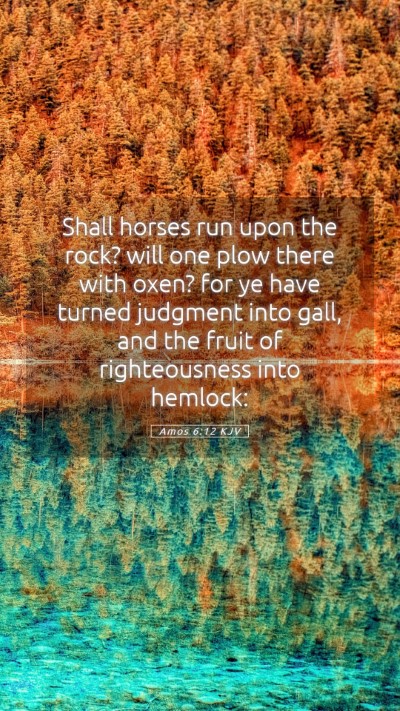Old Testament
Genesis Exodus Leviticus Numbers Deuteronomy Joshua Judges Ruth 1 Samuel 2 Samuel 1 Kings 2 Kings 1 Chronicles 2 Chronicles Ezra Nehemiah Esther Job Psalms Proverbs Ecclesiastes Song of Solomon Isaiah Jeremiah Lamentations Ezekiel Daniel Hosea Joel Amos Obadiah Jonah Micah Nahum Habakkuk Zephaniah Haggai Zechariah MalachiAmos 6:12 Meaning
What is the meaning of Amos 6:12?
Shall horses run upon the rock? will one plow there with oxen? for ye have turned judgment into gall, and the fruit of righteousness into hemlock:
Amos 6:12 Bible Verse Meaning
Amos 6:12 Bible Verse Explanation
Verse: "Shall horses run upon the rock? will one plow there with oxen? for you have turned judgment into gall, and the fruit of righteousness into hemlock:" (Amos 6:12, KJV)
Summary of Meaning
The verse from Amos 6:12 serves as a powerful rhetorical question highlighting the absurdity of the people’s actions in the face of their sinful behaviors. In this passage, the prophet Amos critiques the Israelites' perversion of justice and righteousness, emphasizing their moral decay.
Bible Verse Commentary
- Matthew Henry:
Henry elaborates that this verse illustrates the foolishness of attempting the impossible, akin to making horses run on rocks or plowing with oxen in unfruitful ground.
- Albert Barnes:
Barnes interprets the imagery of running horses and plowing as metaphors for how the Israelites have corrupted their moral and spiritual principles — righteousness had become futile, akin to trying to harvest in barren conditions.
- Adam Clarke:
Clarke emphasizes that the “gall” and “hemlock” symbolize bitterness and poison, illustrating how their justice has become toxic, replacing God’s true righteousness with their own distorted version.
Understanding the Rhetoric
The rhetorical questions posed by Amos serve to shock his audience into realizing the gravity of their situation. Just as it is irrational for horses to run on rocky terrain, it is equally irrational for the Israelites to expect justice while neglecting their moral responsibilities.
Historical Context
In the context of the ancient Near East, horses were symbols of strength and power, while rocks were associated with barrenness. Amos's audience would have understood that attempting to use horses in inappropriate surroundings would yield nothing but failure, drawing a parallel to their spiritual failures.
Application to Daily Life
This verse encourages readers to reflect on their own lives and the integrity of their actions. Are they seeking righteousness in a manner consistent with God's will? Amos' words challenge believers to pursue true justice and righteousness rather than distorted human interpretations.
Related Cross References
- Isaiah 5:20 - Woe to those who call evil good, and good evil.
- Jeremiah 22:3 - Do justice and righteousness, and deliver from the hand of the oppressor.
- Micah 6:8 - He has shown you, O man, what is good; and what does the Lord require of you, but to do justly, to love mercy, and to walk humbly with your God?
Conclusion
Amos 6:12 provides rich insights into the consequences of abandoning divine justice for a distorted version of morality. The teachings of Amos remind readers that true understanding of Scripture involves a commitment to align with God’s principles in both thought and action.


